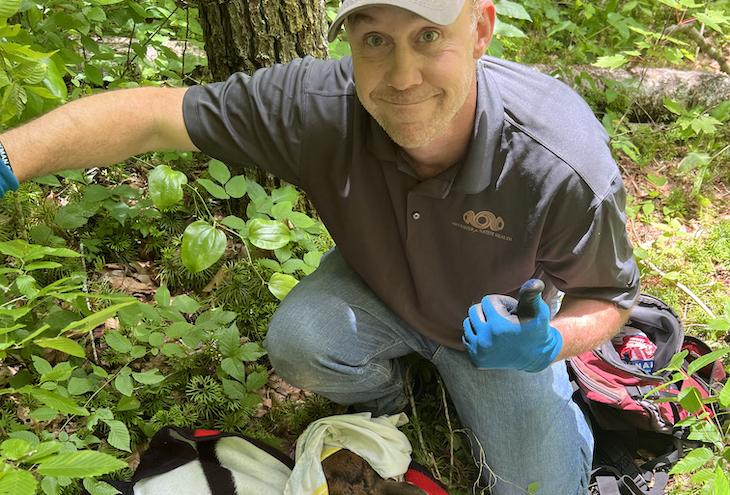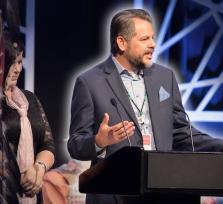“Fun.” That’s the word Dr. Caleb Hickman uses to describe his job. As a supervisory biologist for the Eastern Band of Cherokee Indians, he oversees nearly 37 projects in the Qualla Boundary, a 57,000-acre forested region of western North Carolina that is within the tribe’s ancient home.
Dr. Hickman is a busy man. He and his small team set bear-hair snares and cameras to study the black bear population. He set acoustic microphones to listen for the rare Indiana bat. He seeks ways to use the area’s elk population to boost tourism. He has reintroduced the sicklefin redhorse, a fish whose numbers were decimated by dams. Dr. Hickman even swims in swift currents in search of the giant hellbender salamander, which can grow to almost 30 inches in length and is a vulnerable species. “I’ve always been a jack of all trades,” he says. “I weave my way into different areas whether it’s working with mammals, reptiles, or even plants.”
A member of the Cherokee Nation of Oklahoma, he grew up in Pryor Creek, Okla., and learned the importance of being flexible early. He made the difficult decision to travel more than four hours away to earn his BA at Missouri Valley College, then earned his master’s at Missouri State and, eventually, after a six-year period of work, finished a PhD at the University of Wisconsin–Madison. “I want to inspire kids to be OK with leaving their communities,” he says. “Stick it out. Things aren’t always easy. Work at it. Know that with grit and determination, you can make your career goals happen. Whatever you do, put everything into it.”
Ten years ago, Dr. Hickman jumped at the opportunity to come full circle and return to the land from which his ancestors were forcibly removed. His job puts him where ecology and biology meet. Whether he’s doing research or managing resources, all his work benefits the community.
Growing up, Dr. Hickman hunted, fished, and collected plants, and his identities as an Oklahoman and Cherokee were hard to tease apart. He lived next to a lake but didn’t know the Cherokees’ reverence for clean water was even a cultural thing. In his tribe’s culture “going to water” means spending time beside a creek to pray or going to a riverbank to wash away bad feelings. The draw to clean water was there, but a label of “cultural” was never given.
“Don’t drink water unless it’s rolled over five rocks and a salamander’s back” is a saying Dr. Hickman learned from elders after moving to North Carolina. “That traditional ecological knowledge means the water is clear. It’s clean,” he points out. “From a scientific perspective, salamanders are an indicator species that lives in fast-flowing water, which also means the water is safe.”
Dr. Hickman is based in the town of Cherokee, within the Great Smoky Mountains. When not in the field or writing reports, supervising staff, or doing statistical studies, he might be unwinding with a fast game of Indigenous stickball, a Native sport that predates lacrosse. In both games the stick is about the same size, but in stickball the basket is tiny and holds a golf ball-sized ball. Stickball’s Cherokee name is anetso (ᎠᏁᏣᎣ) — it means “little brother of war.” But no matter how rough a match is, players participate in ceremonial cleansing afterward. “Sometimes you wash a guy who hit you. It’s a way to let things go but also solidifies bonds,” Dr. Hickman says. “When the game is over, it’s over.”
Just as he plays hard and enjoys it, he works hard and looks forward to the challenges. Comparing his work to choosing a different adventure every day, he prizes being creative and being outside. “You get to think outside the box,” he says. “It can be like a scavenger hunt running around and catching animals. The hallmark of this job is having the ability to adapt. This is the best field — there’s nothing else like it.”













